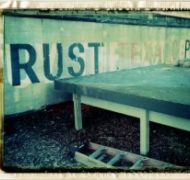Who Can You Trust: Book Review
Blog / Produced by The High Calling
God is jerking me around.
I felt his frustration. My husband had stepped out in faith numerous times…only to face one frustration after another in his ministry.
It’s the same old story: Church loses membership. Church identifies need for change. Church implements change. Parts of the congregation resist.
My husband was part of the change. Just three years previously, he was an unbeliever. But God revealed himself to my man through music and the result was a stunning display of Glory. A new service was added to our worship. My husband became the Praise and Worship Leader. Membership began to pick up. For the first time in years the church welcomed new families into our fold.
But some were not happy about this. Suddenly, people who had prayed with me for twelve years for my husband’s salvation were praying for him to fail. Unkind words were spoken. Meetings erupted in conflict. The congregation was divided.
And we were deeply wounded.
God is jerking me around.
His words stung. Was it really God? And should we have been surprised by the storm of resistance?
Who Can You Trust?
When my editor sent me Howard E. Butt, Jr.’s newest book to review, I found some answers to these and other questions. In Who Can You TRUST: Overcoming Betrayal and Fear, the president of the H. E. Butt foundation and Foundations for Laity Renewal tells me I should not be surprised when the church becomes a source of injury.…Leadership’s survey found that 60 percent of pastors have experienced traumatic events in their professional lives that were extremely difficult to accept. Of that percentage, 85 percent felt betrayed by persons they thought they could trust. When asked if they ever anticipated that anything like this could happen, 80 percent said no. Such experiences are not limited to senior pastors. Music directors, youth pastors, and other leaders within the church have similar stories of betrayal.Ouch. We don’t have to look far to see the imperfections that we bring to the Body of Christ. But if we can’t trust our church families, then who can we trust? And how?
Leap of Faith?
As Christians, we all know we’re supposed to trust God. But when things aren’t going well in our lives, this can be easier said than done. The mystery of trust, says Howard E. Butt, Jr., is that it requires the object sought: only our trusting can finally bring the power of trust to full flower. So how do we overcome our mistrust to take that first step? How do we make that leap of faith? We make a conscious choice to do so, says Mr. Butt.As Christians, we know that the ways of the world are not God’s ways, but God uses people and the institutions of the world for His purposes. Trusting God to be in the unfolding process around us may not be easy, especially if we find ourselves in the middle of a trust-mistrust crisis. Yet we consciously choose to place out trust in God and not in our limited ability to escape a situation or manipulate it to our benefit.Easy, right? But Mr. Butt doesn’t leave us here. He gives us numerous tools to help us move toward a greater trust in God and others.
Recognize, Respond, Reconcile
One powerful tool Mr. Butt recommends is to recognize sinful thoughts and behaviors in our past.Recognition comes from walking in the light. It comes from reflection, from prayer, from self-examination. The old English preacher said that two little prayers head us in the right direction. First, “Lord, show me myself.” Then, after we give Him time to answer the first prayer, comes the second: “Lord, show me Yourself.”After we recognize, we respond. This may require that we forgive someone who wronged us, Butt says, and determine to leave the past behind, dead and buried. These two processes allow us to reconcile our past and our present.
…our remembered past—now reconciled—frees us for the present moment and the exciting future ahead.
Moving Forward
Howard E. Butt, Jr. has much more to say about learning to trust again. Who Can You Trust: Overcoming Betrayal and Fear is filled with stories and wisdom that lead us to a place of confidence in God’s plan for our lives. But where does this leave my husband and me? How do we regain confidence in the congregation we serve? Howard E. Butt says that even a small bit of trust in God can be nurtured to help us with trusting others.…even a wobbly bit of confidence in the trustworthiness of God will expand if we concentrate not on our wobbliness but on god’s steadiness. Confidence in God’s faithfulness reproduces itself. It keeps multiplying. If I nourish it, it grows. If I don’t, it shrivels…If we solidly believe in God’s trustworthiness, we become more sure about when to trust people and when to mistrust them. We don’t operate out of fear; we operate out of a higher trust.When my trust in today withers, I will remind myself to trust in God’s plan. Howard E. Butt’s book Who Can You Trust: Overcoming Betrayal and Fear has helped me tremendously in this process. Who do you trust? **Don't forget to join us next Monday for the start of our new book club! photo by artistofmimicry, used with permission. Post by Laura Boggess.




